Human Rights Management Framework
Human Rights Management Policy
In 2022, SK bioscience revised its Human Rights Management Declaration to comply with and reflect the Universal Declaration of Human Rights and UN Guiding Principles on Business and Human Rights suggesting human rights protection, labor standards, and international principles. We have established a Human Rights Management Statement as a company policy which is integrated with the existing Human Rights Management Practice Guidelines, and the Statement is available on our ESG website. The Statement applies to various stakeholders, including employees, members of domestic and overseas affiliated companies, customers, shareholders/investors, suppliers, and local communities/environment.
Human Rights Implementation System
SK bioscience has declared its commitment to human rights management to ensure the dignity and value of all individuals in all business activities. Our employees also adhere to the Declaration of Human Rights as a standard for their behavior and decision-making. The ESG Committee under the Board of Directors is responsible for managing and overseeing the progress of human rights management and deliberates on matters related to the protection and promotion of human rights of our stakeholders, including our employees.
In addition, we operate a Working Council and a Team in charge of human rights management to promote effective human rights management. The Division in charge of human rights management conducts an annual human rights impact assessment to evaluate and improve the level of our human rights management. The Human Rights Management Working Council implements and reviews action items identified through human rights impact assessments and continuously identifies, assesses, and responds to human rights risks.
Human Rights Risk Management
Overview of Human Rights Risk Management
SK bioscience has established a human rights risk management process to prevent negative human rights impacts that may arise from the Company’s management or business activities and ultimately contribute to the realization of human rights. In accordance with international human rights norms (the Universal Declaration of Human Rights, the UN Guiding Principles on Business and Human Rights, OECD Guidelines for Multinational Enterprises, etc.) and the EU standards for Human Rights Due Diligence, we conduct a human rights impact assessment to identify human rights related risks and impact.
Human Rights Impact Assessment
Implementation of Human Rights Impact Assessment
In order to systematically review the impact of business activities on human rights and effectively manage risks, SK bioscience conducted a human rights impact assessment in 2023 for employees, and in 2024 for on-site suppliers and local community (Andong).
Collaborating with a third-party organization, we ensured objectivity in risk determination and identified actual and potential human rights risks through the human rights impact assessment process. We measured the extent of risk to vulnerable groups and evaluated their priority.
Following this, we identified major human rights risks that could impact employees, suppliers, and local communities categorized them by topics, and systematically defined and prioritized each risk. Based on this, we establish a mid- to long-term roadmap, execute, and monitor improvements.
Human Rights Impact Assessment Process
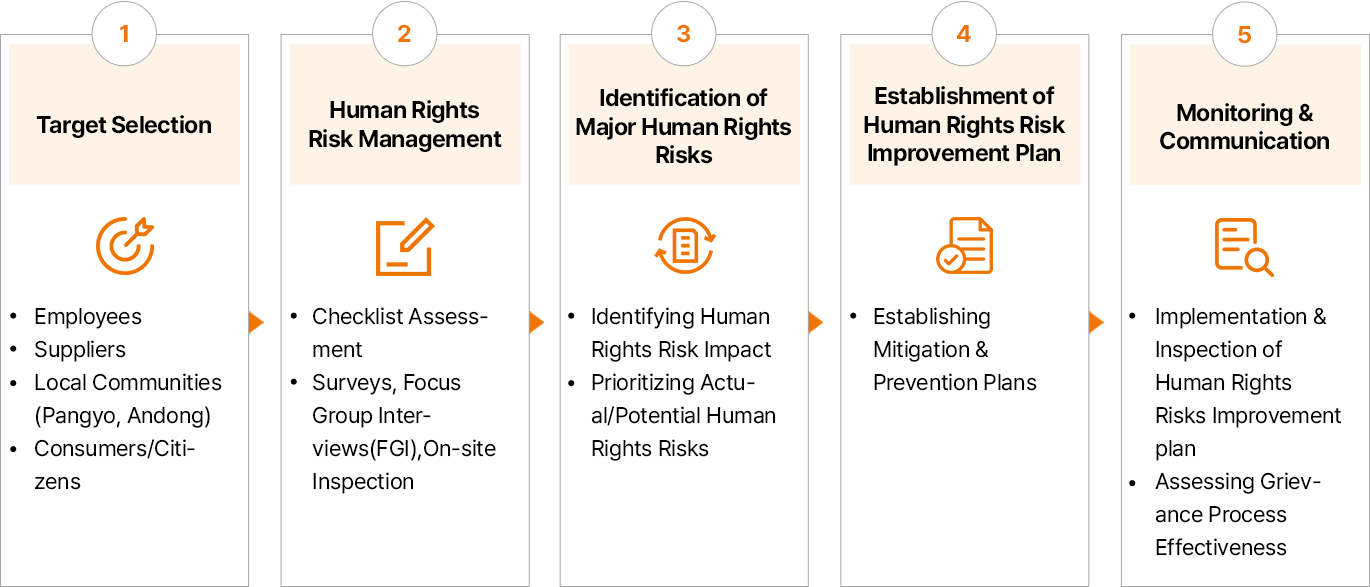
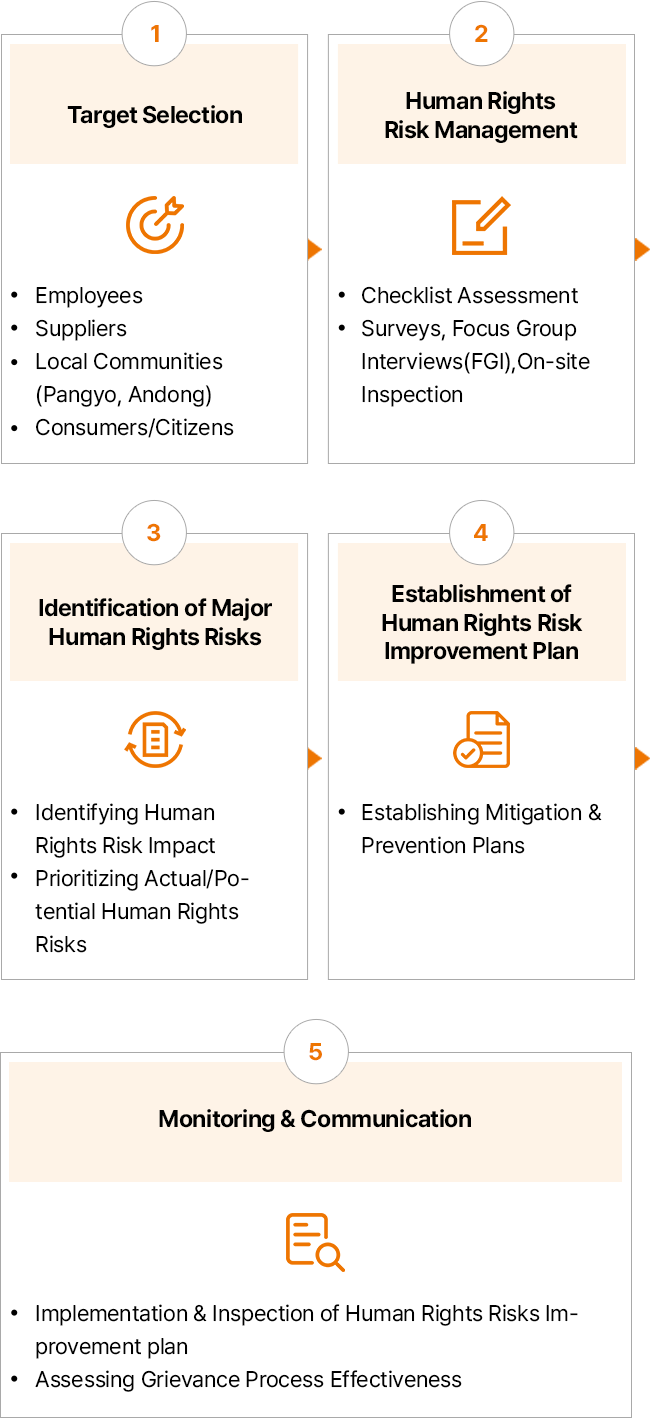
-
- 1. 대상 선정
- 임직원
- 협력사
- 지역사회(판교, 안동)
- 소비자/시민
-
- 2. 인권 리스크 평가
- 체크리스트 진단
- 설문조사, FGI, 현장점검
-
- 3. 주요 인권 리스크 식별
- 인권 리스크 영향도 식별
- 실재적/잠재적 인권 리스크 우선순위화
-
- 4. 인권 리스크 개선계획 수립
- 완화 및 예방 계획 수립
-
- 5. 모니터링 및 소통
- 인권 리스크 개선계획 이행 및 점검
- 고충처리절차 효과성 평가
Result of Human Rights Assessment
SK bioscience includes various stakeholders who are vulnerable to human rights risks, including our own employees as well as our partners and local communities, and within each stakeholder, we assess risks by categorizing detailed vulnerable groups that can be directly or indirectly affected by major human rights risks. We derive improvement tasks based on the results of our annual human rights risk assessment and monitor the implementation status periodically.
| Stakeholders (Vulnerable Groups) |
Human Rights Areas | Risks Definition | Key Improvement Tasks |
|---|---|---|---|
| Employee | Labor Conditions | Improving the working environment for vulnerable groups to foster a corporate culture based on diversity, equity, and inclusion (DE&I) |
|
| Enhancing internal systems to proactively ensure workers' freedom of association and rights, actively listening to and communicating with employees |
|
||
| Identifying, eliminating, and managing hazardous risks in the workplace to ensure employee safety and health |
|
||
| Improving working environment efficiency by supplementing the working hours management system and policies |
|
||
| Equal Treatment & Opportunities | Creating a corporate culture & establishing effective response procedures to prevent workplace deterioration due to increased diversity of employees and changes in socio-cultural values |
|
|
| Remedy & Grievance Handling |
Improving the accessibility, anonymity, and transparency of internal grievance channels to alleviate usage inconvenience & fostering a healthy organizational culture |
|
|
| Supplier1) | Human Rights Policy & Risk Management |
Strengthening human rights risk management in the supply chain |
|
| Labor Condition | Operating a management system to proactively ensure the three labor rights (right to organize, right to collective bargaining, and right to collective action) & health and safety |
|
|
| Equal Treatment & Opportunities | Fostering a culture of diversity, equity, and respect within our partner workforce | ||
| Local Community (Andong) | EconomicㆍSocialㆍCultural Rights | Establishing a process for communicating with local community about the results of regular inspections of environmental impacts caused by business activities |
|
| Establishing procedures and precautions to ensure community's health and safety |
- 1)In-house Suppliers (Songdo R&PD Center, Andong L HOUSE)
Effectiveness Evaluation after Implementation of Improvement Tasks
SK bioscience has been categorizing and implementing the mid- to long-term improvement tasks derived from the human rights impact assessment since 2023, and regularly monitors the implementation status. In addition, we evaluate the effectiveness of each task based on the monitoring results, and the results of the effectiveness evaluation of key improvement tasks out of a total of 49 improvement tasks derived in 2023 are as follows. Additionally, we report the implementation status of human rights risks improvement tasks to the ESG Committee and the management every year.
| Target | Time Horizon | Human Rights Areas | Key Improvement Tasks | Implementation Rate | Effectiveness Evaluation Results |
|---|---|---|---|---|---|
| Employee | Short-term | Labor Conditions | Determining the way to elect members of Labor-Management Council and tenure | 98% | Council members are selected by members vote and tenure is 2 years |
| Establishing various labor-management channels | Labor-management council launched in May 2022, and diverse channels (HR talk talk, Town Hall meetings, etc.) are operating | ||||
| Establishing the Grievance Committee rules for female participation | Designated female members and operated the Committee by worksites (Pangyo/Andong) | ||||
| Mid-term | Ensuring annual leave coverage & a plan for after-the-fact compensation | 92% | The annual leave is based on self-approval system, and those unused annual leaves are paid out in the next year | ||
| Remedy & Grievance Handling | Requiring confidentiality agreements for those involved in workplace bullying and sexual harassment | Signed and managed confidentiality agreements from those relevant members | |||
| Long-term | Labor Conditions | Considering establishment of a children daycare center when relocating to Songdo | 57% | A preferred bidder for daycare contractor selected and follow-ups are underway | |
| Equal Treatment & Opportunities | Musculoskeletal hazards survey for drug substance production workers | A task force has been formed to review and is on track to complete in 2026 |
Mid- to Long-term Goals
In 2025, we plan to conduct a human rights impact assessment for our employees. In 2026 and beyond, we plan to gradually expand the scope of the Human Rights Impact Assessment to include key suppliers, local community (Songdo), and consumers, and by 2028 we plan to include key stakeholders and vulnerable groups in our value chain.
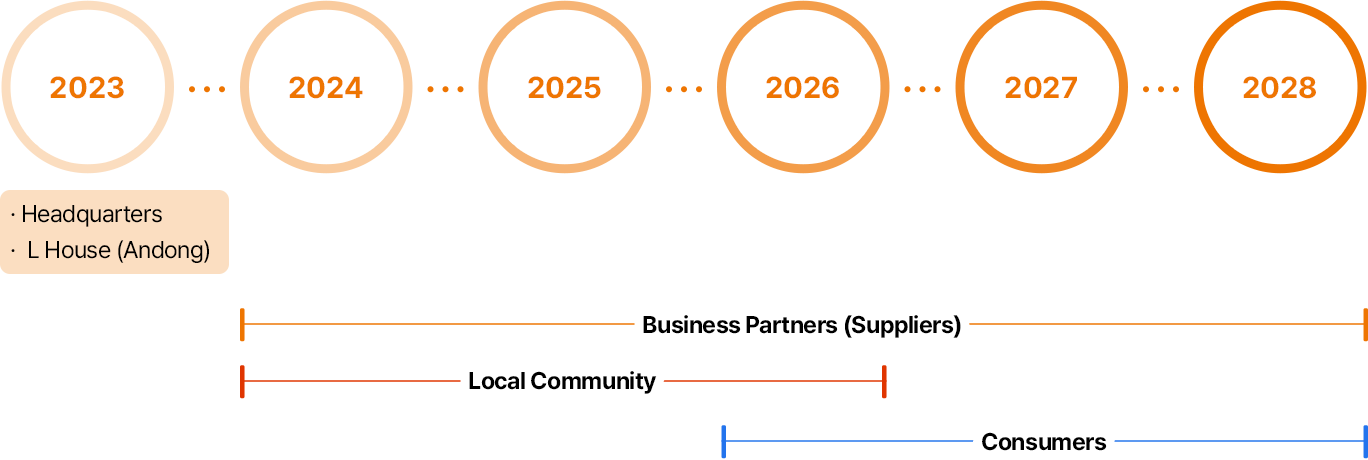

- 2023년 : 본사, L HOUSE
- 2024년~2028년 : 협력사
- 2024~2026년 : 지역사회
- 2026~2028년 : 소비자
Human Rights Training
To promote a culture of respect for human rights, SK bioscience conducts regular sexual harassment prevention training and disability awareness training on our learning platform, mySUNI, every year. These training programs, which have been conducted over the past three years, aim to enhance the human rights sensitivity of our employees and raise their awareness of the importance of respecting human rights. In 2024, 100% of our employees completed both the sexual harassment prevention training and disability awareness training.
Human Rights Grievance Handling
SK bioscience operates reporting channels to identify and resolve human rights violations occurring both inside and outside the Company. The online reporting channel categorizes issues such as verbal abuse, physical violence, sexual harassment, exclusion from work, and personal errands among employees under "lack of respect for employee dignity" and treats them as violations of ethical norms. Moreover, guidelines for addressing workplace bullying and sexual harassment are available on our company website, and we have established a grievance process to protect victims.
The results of the annual investigation are reported to the Board of Directors. The insights derived from these issues are then incorporated into internal regulations or guidelines and shared with employees through the Ethical Management Practice Letter to raise awareness and vigilance. Also we diligently track the number and causes of grievance reports and make efforts to resolve them, as well as protect the identity of the informant to ensure they do not face any disadvantages for reporting.
Grievance Handling Process (In-house)

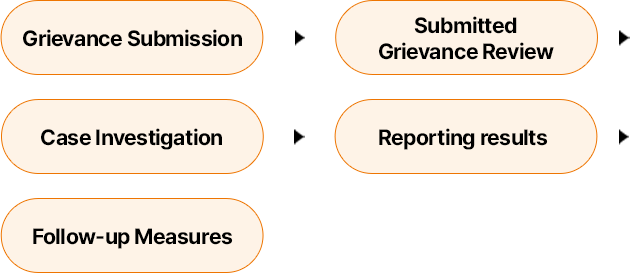
- 고충 접수
- 제보 검토
- 조사 착수
- 결과 보고
- 후속 조치
Human Rights Violation Report Channel
| Website | https://ethics.sk.co.kr |
|---|---|
| skbioscience.ethics@sk.com | |
| Telephone | 02-2008-2338 |
In early 2024, SK bioscience established an external human rights grievance handling channel, allowing employees to report workplace bullying and sexual harassment issues to external experts. This initiative aims to enhance the anonymity, accessibility, and independence of the grievance handling system for employees and to actively practice human rights management.
Grievance Handling Process (External)

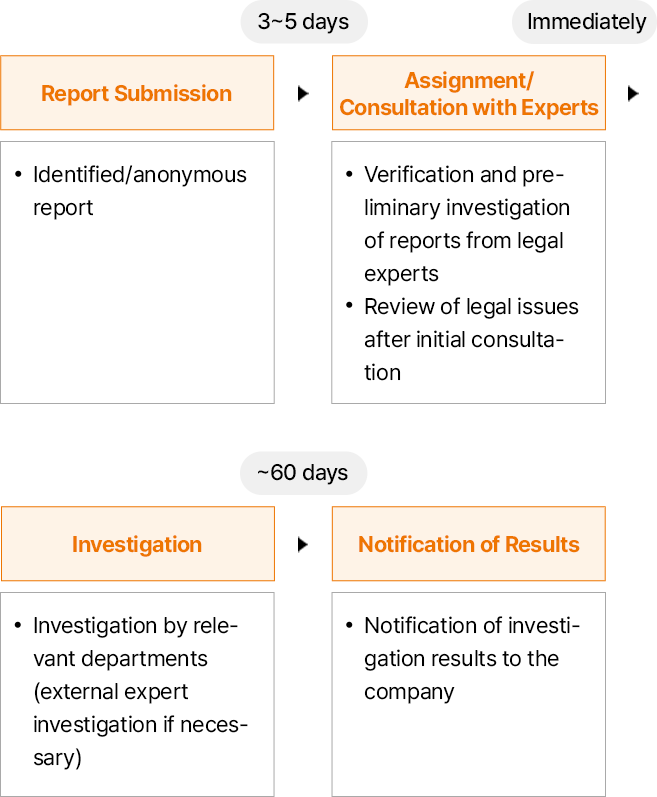
-
- 제보 접수
- - 실명/익명 신고
3~5일
-
- 전문가 배정/상담
- 법무법인 지평 소속 전문가
- 신고 내용 확인 및 기초조사
- 1차 상담 후 법적쟁점 검토
즉시
-
- 조사
- 유관 부서 조사
- 단, 필요 시 외부 전문가 조사*
~60일
-
- 처리결과 안내
- 회사에 조사결과 전달
Procedures for Addressing Workplace Bullying and Sexual Harassment
Since the establishment of procedures for addressing workplace bullying and sexual harassment in 2022, SK bioscience has actively maintained and refined these protocols to foster a positive working environment. Upon the occurrence of workplace bullying, we implement procedures grounded in the principles of 'Empathy,' 'Confidentiality and Non-Retaliation,' 'Fair and Swift Care,' and 'Recovery and Recurrence Prevention.' Furthermore, in 2023, we enforced a zero-tolerance policy, treating workplace bullying and sexual harassment as severe violations of human rights, leading to stringent disciplinary actions against offenders. This policy rigorously safeguards the human rights of our employees.
